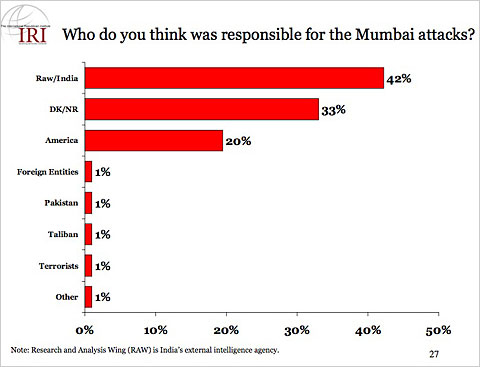Daily Times - Leading News Resource of Pakistan
The liberal and secular ethos is limited to a tiny minority. Most Pakistanis are not only beholden to religion in a big way but are intrinsically opposed to western style democracy and especially the freedoms that come with it
The fight against Taliban is at this time primarily a fight by the Pakistani state to enforce law and bring order to its territory. As such,
all citizens of the country and those that wish Pakistan well must support the army in this effort to restore the ‘writ’ of the state. But that is not all this is about.
First what it is not about. It is not about the US or the drone attacks. It is not about India and Kashmir. It is not about the Taliban fighting the US and NATO forces in Afghanistan. And it is definitely not about the Bilderberg Group.
Many in the English language media within the country as well as in the foreign media maintain that the fight against the Taliban in Pakistan is somehow a fight between the forces of liberalism and democracy against the forces of religious extremism and a theocratic impulse. This is entirely wrong.
The forces of liberalism, democracy and secularism lost the fight sixty years ago when the Objectives Resolution was passed by the Constituent Assembly of Pakistan. Since then, at best these forces have a fought a losing battle against the Islamisation of Pakistan.
Today, Pakistan is firmly and without argument an Islamic state with a constitution that clearly and unambiguously states that no laws can be repugnant to Islam.
What Pakistan has seen since the death of Mohammad Ali Jinnah in 1948 is essentially a fight between competing visions of piety.
For the first twenty years of its existence, Pakistan was under the sway of a ‘kinder and gentler’ version of Islamic practice as envisioned by the Sufi influenced Hanafi-Barelvi majority of the country.
Once General Zia-ul Haq took over and the Afghan war started, the religious centre of the country rapidly shifted under official patronage towards the more austere and extreme Wahhabi-Deobandi interpretation of Islam. The Taliban are a product of that interpretation and find support within the country from those that adhere to that vision of Islam even outside the border areas.
Even today, it was only after the religiously conservative political forces led by the PMLN and the organisations belonging to the Hanafi-Barelvi school came out against the Taliban that the Pakistan Army agreed to embark on a major offensive against the Taliban. I sincerely hope that this action is successful in restoring the rule of law in the disputed areas in Swat and eventually even in the western borderlands.
However, there are a couple of important points that must be considered.
First is the fact that any military action within the boundaries of the country is going to produce considerable hardship, including casualties among non-combatant citizens. This is already happening and if it continues over a long period of time, public opinion is going to start turning against this military action.
As such, it is best to remember the famous quote attributed to General William Tecumseh Sherman: “war is hell”. The present military action in Swat, and if in the near future it is also extended to other areas in Pakistan where the Taliban are a significant presence, will lead to much death and destruction. It is therefore important for both the civilian and the military leadership to be frank and open about this, and warn the people about what to expect. Platitudes about a quick and painless victory will be self-defeating.
The second point worth considering is that for the army to succeed, it needs the full support of the people. This can only happen if the religiously inclined people of Pakistan that oppose Taliban-style Islam are willing to come out openly and forcefully in support of the army. This, however, will have its own set of consequences.
Once the non-Taliban types are fully mobilised, what we will see is not necessarily a victory of secular democratic forces but rather of the Islamic ideation of a different mindset; but still very much Islamic and perhaps even equally extreme in its own way. I do not believe that Pakistan is headed towards an Iranian-style theocracy but we might not end up too far from it either.
Let us not forget that we came pretty close to having the Fifteenth Amendment to the Constitution (The Sharia Bill) just ten years ago, and the political party that wanted to pass it is, according to many, poised to take control of Pakistan come the next general elections. I
f that party does come to power in a few years and if the present military action has indeed spawned another lurch towards religious extremism, all bets are off as to what might happen next.
Why am I so pessimistic? Well, many in Pakistan will consider the scenario I present as a good thing. However much noise the chattering classes, the literati and the glitterati might make, the liberal and secular ethos is limited to a tiny minority.
Most Pakistanis are not only beholden to religion in a big way but are intrinsically opposed to western style democracy and especially the freedoms that come with it.
My pessimism is compounded by my interaction with young people, many of whom have come through ‘English medium’ schools and colleges and are quite willing to go the West to pursue further education or even migrate for good. Yet few if any of them are able to identify the Islamic ‘fiqh’ (system of belief) they belong to and are entirely devoid of any knowledge about Sufism.
We have lost our young to a monolithic and extreme vision of Islam through neglect and inadequate education about the glorious diversity within Islam. It is now time to pay the piper.
[email protected]



